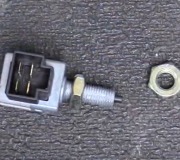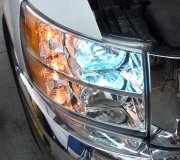Current goes through the brake light switch, then through two sets of contacts inside the signal switch. Since the cruise control cancels from a tap on the brake pedal, it must have a good electrical circuit from the brake light switch to do that. For safety, one of the cruise control's power wires is tied right to that brake switch feed wire. That way, if the brake light fuse were to blow, you would never get that cancel signal, but it's irrelevant because the cruise control won't even turn on. What that boils down to is if the cruise control works, that part of the circuit is good.
Many cars now have an entirely separate part of the brake light switch just for the cruise control cancel function, but if you find only two wires on your switch, when it's turned on and voltage appears on the white wire, that tells the cruise control to turn off. The clue here is if the cruise control works, AND it turns off when you tap the brake pedal, you know the switch is working. That observation doesn't apply when there's four or six wires on the brake light switch. On some designs, the cruise control gets a ground through the signal switch and either of the brake light bulbs. A problem anywhere in that part of the circuit will prevent the cruise control from working. That applies more to aftermarket add-on cruise controls, but it's worth keeping in mind.
From the brake light switch, current goes into the signal switch, then splits into two circuits for the left and right side. Turning the signal switch to the left breaks the left circuit from the brake light circuit and connects it to the flasher circuit. It leaves the right side alone. It is pretty unlikely for two different sets of contacts to become burned or pitted, but you might suspect the common terminal where the brake light wire comes in. It's not real common for terminals in switch connectors to overheat and melt for the brake lights because that circuit isn't turned on long enough for that to occur, but it's still worth looking at the connectors for signs of corrosion or looseness.
The last observation has to do with the brake lights themselves. On normal cars the brake and signal lights are one and the same. That's not the case with a lot of newer cars like I'll never own. If both the left and right signals work, you know the wiring to the bulbs is okay. That just leaves the signal switch and wiring between it and the brake light switch. Anything in that circuit could be intermittent, and you might be disturbing the real problem when you replace the brake light switch. That could make it work for a little while. Proof of that would be found by reinstalling an old brake light switch to try it once you have the system working. If the old one works, it wasn't really defective.
If the signal lights also don't work but the front ones light up, suspect corroded wires going to the rear. For many years GM used aluminum wire for the rear harness and they had all kinds of trouble. The insulation is translucent. If it gets cut or nicked, moisture will cause corrosion. This was a real common problem when people used Scotch-Lok connectors to install trailer wiring. Those connectors cut the insulation but don't seal out moisture. Another common problem was found in the fuse box where those wires were riveted to the brass connections with steel rivets. Any two different kinds of metal and an acid is a battery. "Galvanic action" will corrode the aluminum wire and cause an intermittent connection. The typical acid was road salt, and the fuse box was right in front of the driver's feet so it was common for the salt to find it's way up there.
Thursday, June 30th, 2011 AT 7:53 AM



